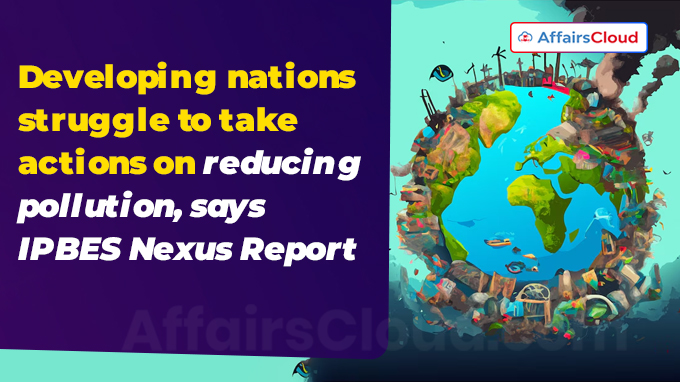 On December 17 2024, the Intergovernmental Science-Policy Platform on Biodiversity and Ecosystem Services (IPBES) launched its assessment report on the Interlinkages Among Biodiversity, Water, Food and Health known as the Nexus Report.
On December 17 2024, the Intergovernmental Science-Policy Platform on Biodiversity and Ecosystem Services (IPBES) launched its assessment report on the Interlinkages Among Biodiversity, Water, Food and Health known as the Nexus Report.
- As per the report, Pollution is a main driver responsible for degradation of biodiversity, water quality and human health.
- The report has identified 5 ‘nexus elements’ including: biodiversity, water, food, health and climate change, and found that all these elements are interconnected, influence each other and have consequences when combined.
About the IPBES Nexus Report:
i.This latest report was approved by delegates of 147 countries that are members of IPBES at the 11th IPBES Plenary session held in Windhoek, Namibia.
ii.The report was prepared by 165 leading experts from 57 countries worldwide.
iii.The report provides the scientific evidence required to support achievement of the Sustainable Development Goals (SDGs), Kunming-Montreal Global Biodiversity Framework and Paris Agreement on climate change.
Key Findings:
i.As per the report, 90% of premature deaths from pollution are reported from Low-and-Middle-Income Countries (LMICs) and found air pollution was the reason for these premature deaths.
ii.The report highlighted that for the past 30 to 50 years, all assessed indicators indicate that biodiversity is declining by 2 to 6% per decade.
iii.As per the report, the finance gaps to meet the biodiversity requirements are USD 300 billion to USD 1 trillion annually, and required additional investments to meet the SDGs most directly related to water, food, health and climate change are minimum USD 4 trillion annually.
iv.The report underscored about the persistent inequalities in food security as 80% of the undernourished cases are in developing countries. As per the report, less diverse and unhealthy diets are the main cause of non-communicable diseases worldwide.
v.Over 50% of the world’s population is living in areas experiencing the highest impacts from declines in biodiversity, water availability and quality and food security, negative impacts of climate risks, among others. Mostly developing countries including small island developing nations, indigenous peoples are affected by these burdens.
- As per the report, 41% of people live in areas that witnessed strong declines in biodiversity between 2000 and 2010, 9% in areas that saw high health burdens and 5% in areas with high levels of malnutrition.
Other Key Projections:
i.The report has outlined some future challenges based on its assessment of 186 scenarios from 52 separate studies, which project interactions between 3 or more of the nexus elements up to 2050 and 2100.
ii.It is estimated that the unaccounted-for costs of current approaches to economy activity on 5 nexus elements, are minimum USD 10 to USD 25 trillion per year. Apart from this, there are direct public subsidies to economic that have negative impacts on biodiversity, reaching to around USD 1.7 trillion annually.
- These further lead to economic activities that cause the environment, amounting to around USD 5.3 trillion annually.
About Intergovernmental Science-Policy Platform on Biodiversity and Ecosystem Services (IPBES):
It is an independent intergovernmental body founded in 2012. It aims to bolster the science-policy interface for biodiversity and ecosystem services for the conservation and sustainable use of biodiversity.
Executive Secretary- Dr. Anne Larigauderie
Member nations- 147
Headquarters- Bonn, Germany




